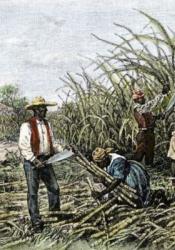Slave Emancipation Act/ Slavery Abolition Act
In chapter 29 (prefaced as one that "Introduces Some Respectable Characters with Whom the Reader Is Already Acquainted..."), Dickens gathers Sikes, Fagin, the Artful, and Bates together as Nancy faints. After they revive her, they reveal that they've been away procuring some food, including wine, rabbit pie, and sugar. The Artful remarks that the sugar is "a pound and a half of...that the n****** didn’t work at all at" (Dickens 372). The men are commenting on the brutal sugar cane industry, propelled by enslaved Africans, through English colonization in the Caribbean.
One of the most brutal jobs of the industry was "holeing" or that of "digging holes to plant sugarcane" (Radburn). It was largely performed by enslaved members of "jobbing gangs" (Radburn). These workers ("jobbers") were contracted out by the typically middle class men who owned them (they did not own the plantations) to keep plantation slaves alive and healthy longer, and "although scholars know of the existence of jobbing gangs, they have neither fully explored their role in plantation management nor examined the lives of the tens of thousands of people who were enslaved within them" (Radburn).
Though the Slavery Abolition Act freed "800,000 enslaved Africans," it was mostly a response to growing complaints that England, who had a monoploy on the industry, was now no match for "larger plantation economies such as those of Cuba and Brazil" who were able to prodcue much more than what was produced in the Caribbean (Henry). It was a political maneuver to make sugar more accessible and cheaper in the new globalizing world economy, not an act to help slaves who were brutalized and murdered by the backbreaking labor of the industry. And though slaveholders were compensated for their lost slaves, those newly freed recived no compensation or assistance (Henry).
Dickens, Charles. Oliver Twist. Amazon Classics. Kindle Edition.
Henry, Natasha L.. "Slavery Abolition Act". Encyclopedia Britannica, 25 Jul. 2020, https://www.britannica.com/topic/Slavery-Abolition-Act. Accessed 19 February 2021.
Radburn, Nicholas and Justin Roberts. "Gold versus Life: Jobbing Gangs and British Caribbean Slavery." The William and Mary Quarterly, vol. 76 no. 2, 2019, p. 223-256. Project MUSE muse.jhu.edu/article/723126.

